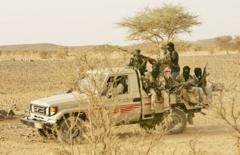What Happened When Militants Blocked a Key Senegal-Mali Trade Route?

Published: 2025-09-17 11:30:47 | Category: world
The blockade imposed by Islamist militants in Mali is a significant escalation in the jihadist insurgency affecting the country, particularly impacting the supply of essential goods, including fuel. The Malian government, led by Prime Minister Abdoulaye Maïga, has acknowledged the situation's seriousness and is taking steps to enhance security along key transport routes.
Last updated: 30 October 2023 (BST)
Key Takeaways
- The blockade affects major highways and threatens the supply of fuel in Mali.
- Islamist militants, particularly Jama'at Nusrat al-Islam wal-Muslimin (JNIM), have increased their operations in southern Mali.
- The Kayes region is crucial for Mali's economy, accounting for 80% of the country's gold production.
- The situation highlights the limitations of military force in addressing the ongoing security crisis.
- Trade between Mali and Senegal is at risk due to disruptions in transport routes.
Understanding the Blockade and Its Implications
The blockade initiated by militants marks a critical juncture in Mali's ongoing battle against jihadist insurgency. Historically, al-Qaeda-affiliated groups have targeted military installations and security forces; however, their recent shift towards economic warfare through blockades signals a new phase of conflict.
Background of the Insurgency in Mali
Since 2012, Mali has faced a severe security crisis, spurred by violence from various militant groups, including those aligned with al-Qaeda and the Islamic State (IS). This insurgency has led to thousands of deaths and has destabilised the region significantly. The Sahel region, where Mali is located, is now recognised as a global terrorism hotspot, accounting for over 50% of all terrorism-related fatalities worldwide.
The Role of the Kayes Region
The Kayes region serves a dual purpose: it is both a vital economic hub and a strategic entry point for goods into Mali from Senegal. The region is responsible for a significant portion of Mali's gold production, making it critical for the nation’s economy. Disruptions in this area can have far-reaching consequences, potentially crippling the country’s supply chains.
Recent Developments in the Blockade
The blockade reportedly began with the kidnapping of six Senegalese lorry drivers in early September, which raised alarms about the safety of transport routes. Armed militants, believed to be part of JNIM, have since erected checkpoints to control the flow of goods and have been extorting "taxes" from traders. Reports indicate that they have torched vehicles and attacked convoys, leading to a complete shutdown of transport in affected areas.
Economic Asphyxiation as a Strategy
Experts, including Mamadou Bodian from Senegal's Cheikh Anta Diop University, suggest that the militants aim to economically suffocate the Malian state. This strategic shift away from direct military confrontations towards economic sabotage highlights a sophisticated approach to asserting control over territory.
Government Response and Local Sentiment
The Malian army's response has been mixed. Initially, officials downplayed the blockade, framing it as a narrative orchestrated by foreign media. However, recent military operations, including airstrikes against JNIM camps, indicate a recognition of the severity of the threat. Despite these efforts, many locals remain sceptical, reporting that militant checkpoints persist and transport operations have been halted due to fears of violence.
The Broader Regional Impact
As the blockade persists, the implications extend beyond Mali’s borders. The disruption of trade routes has raised concerns in neighbouring countries, particularly Senegal, which relies heavily on imports from Mali. The Union of Senegalese Truckers has expressed alarm over the abductions of drivers and the potential for a prolonged blockade that could affect regional stability and trade.
Potential for Regional Instability
Analysts are concerned that if JNIM succeeds in isolating regions like Kayes, it could set a precedent for similar actions in other parts of West Africa. This could lead to increased tensions between Mali and its neighbours, further destabilising the already fragile Sahel region.
The Future of Mali's Security Landscape
The ongoing crisis highlights the limitations of Mali's reliance on military solutions, particularly in the face of a well-entrenched insurgency. The involvement of foreign mercenaries, notably the Wagner Group, adds complexity to the situation, raising questions about the effectiveness of such external support in stabilising the region.
What Lies Ahead for Mali?
The situation remains fluid, with the potential for the blockade to evolve into a more extensive siege. This could undermine confidence in the Malian government and expose its vulnerabilities. As the militants adapt their strategies, the need for a comprehensive approach that addresses the root causes of instability—beyond mere military action—becomes increasingly urgent.
In conclusion, the blockade in Mali represents a critical challenge not only for the country's immediate security but also for its long-term economic stability. As the region grapples with the consequences of this insurgency, the hope for a peaceful resolution remains uncertain. How will the Malian government navigate these complex challenges moving forward?
#Mali #Insurgency #SahelRegion
FAQs
What is the blockade in Mali?
The blockade in Mali refers to the restrictions imposed by Islamist militants on major highways, significantly affecting the supply of goods, particularly fuel, and leading to increased violence against transporters.
Who are the militants behind the blockade?
The blockade is primarily attributed to Jama'at Nusrat al-Islam wal-Muslimin (JNIM), an al-Qaeda-linked group that has escalated its operations in southern Mali, including the Kayes region.
What impact does the blockade have on Mali's economy?
The blockade threatens to disrupt essential supply chains, particularly for fuel and food, which could cripple the Malian economy and destabilise the capital, Bamako.
How has the Malian government responded to the blockade?
The Malian government has acknowledged the seriousness of the blockade and has conducted military operations against JNIM, but local sentiments remain sceptical regarding the effectiveness of these measures.
What are the implications for neighbouring countries?
The blockade poses risks to regional trade, especially with Senegal, which relies on imports from Mali. There are concerns that similar tactics could spread to neighbouring countries if the blockade continues.



